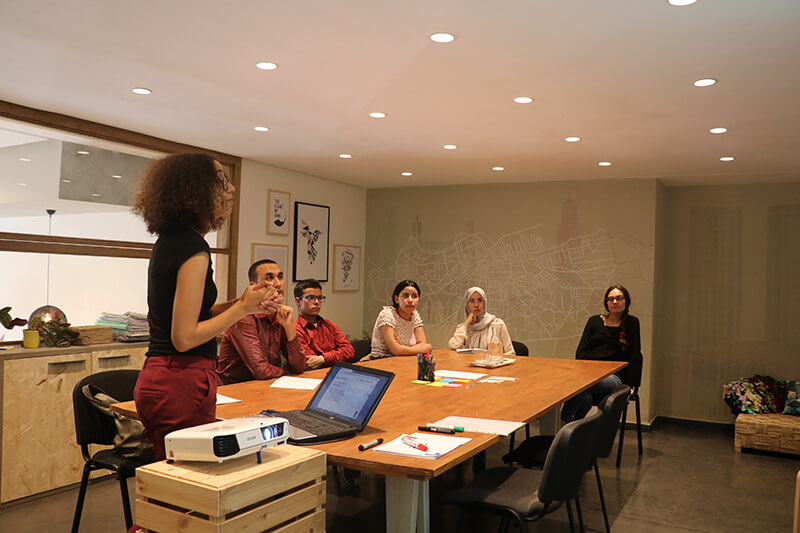
How To Learn Communication Skills For School and at The Workplace
 Finding out how to learn communication skills is a great initiative for students in preparation for their integration into the workforce. Not everyone is born a naturally gifted communicator but there are steps to develop communication skills that we will tackle in this blog.
Finding out how to learn communication skills is a great initiative for students in preparation for their integration into the workforce. Not everyone is born a naturally gifted communicator but there are steps to develop communication skills that we will tackle in this blog.
The Importance of Effective Communication
People have very unique ways of communicating. Our ever-evolving natures mean that the way we communicate changes as well with time. Generation Z for example can communicate through social media using very specific terms that the older generations can no longer relate to. There’s “corporate jargon” or “management speak” which if you’re not familiar with can often be difficult to understand. Most workplaces deem “corporate speak” as an asset. The inability to keep up could even prove detrimental to your career. Terms tend to be more specific as well depending on your profession.

There are always new and emerging ways to convey messages that sometimes don’t even make use of language. Friends can understand each other by simply giving each other looks. Similarly, children can pick up on their parent’s change of mood just by the way they’re looked at.
When it all boils down to it, communication is simply how people understand each other. This is why it’s important to learn social skills. And ultimately, it ties in with how people can have successful communication and relationships whether at home, in school, or the workplace.

Main Types of Communication
There are differing claims on how many types of communication exist. To know how to develop good communication skills, let’s explore the many different ways to do so.
Verbal Communication
The use of either language or sign language is the characteristic of verbal communication. It’s also the most common type of communication. Simply put, it is the presentation of your thoughts that follows a verbal format. In how to learn communication skills, verbal communication is important in school and the workplace. Practicing this is important because people always tend to remember those who speak with clarity, confidence, and charisma.
Most people possess the means and ability to communicate verbally but whether one can maximize this capability is another thing entirely. And that’s why in how to learn communication skills, it is important to know the four different types of verbal communication.
1. Intrapersonal Communication
The intrapersonal communication channel is where you are able to talk to yourself. This is where composure begins. It is important to utilize this channel in order to articulate your thoughts better. Being in tune with yourself means being able to be a more effective speaker and communicator. Practice being mindful, have chosen the right words, and formed your sentences properly.
2. Interpersonal Communication
Interpersonal communication is a more intimate type of communication that happens between two people. It is important to practice interpersonal communication first in how to learn communication skills before proceeding to be an effective communicator to a larger group. Learning how to listen to one person and watch out for cues as to whether they are understanding or receiving your intended message. This will help you strengthen communication skills.
3. Small Group Communication
After learning how to be an effective communicator interpersonally, you can practice communication skills in smaller groups. This helps build confidence. Moreover, being able to communicate with more than one person comes in handy during work meetings or group collaborations in school. The important thing about small group communication is finding the balance between listening and giving everyone a chance to speak.
4. Public Communication
Public communication or public speaking is the addressing of a large number of people at once. It’s also considered one of the most daunting types of communication. Speeches, presentations, orations, and public campaigns are just some of the different ways of public communication. Public communication utilizes all the other types of verbal communication on a larger scale.
For more tips on how to improve public communication, check out our previous blog on How To Improve Your Public Speaking Skills.

Verbal Communication Elements
Aside from the four main types of verbal communication, there are also three additional elements to verbal communication. When improving your communication skills, these three elements are important to consider.
1. Tone
The tone in which you convey your message could be just as telling as the words you speak. People pick up on nonverbal cues. So being mindful of how you sound when speaking also plays a big role in how to learn communication skills.
2. Speed
The speed or pace at which you speak also determines how effectively you can convey messages. When delivering speeches or making presentations, it is important to not speak too rapidly. Talking too fast risks misunderstandings. You shouldn’t speak too slowly either to the point of boring your audience. There is absolutely a perfect in-between pace in speaking that one must master in order to be a good communicator.
If you need the right materials to go along with your new communication skills, get help writing your business research papers and reports with Homework Help Global.
3. Volume
The volume at which you speak can mean different things. There’s a difference between modulating your voice for public speaking and shouting. One could also speak too softly and be completely inaudible which is not ideal either. Voice modulation should depend on the social context and learning how to gauge that is an important factor to improve good communication skills.
There are plenty of ways to improve verbal communication. And mastering the different types and elements will bring you closer to becoming a better and more effective communicator.

Nonverbal Communication
According to Thought Co., nonverbal communication, also known as “manual language”, is a communication process that does not make use of words whether spoken or written. In 1994, author and professor of communication from the University of Arizona, Judee Burgon, identified seven types of nonverbal “dimensions”.
1. Personal Appearance
2. Kinesics
3. Physical Environment
4. Chronemics
5. Proxemics
6. Haptics
7. Vocalics
Even without the use of language, nonverbal communication remains an effective and essential way of communicating. It is important that we stay aware of even body language because it can say a lot without actually saying anything. Whenever we do use verbal communication, our body language should reflect what we are saying in order to not send mixed messages. This is so we can avoid misunderstandings. According to Erkin Zaynutdinov who wrote a research on nonverbal communication, the difference between verbal and nonverbal communication is that verbal communication originates from the frontal lobe of the brain which is controllable. Nonverbal communication, on the other hand, originates from the temporal lobes, which makes it difficult, if not sometimes impossible, to control.
In how to learn communication skills, mastering the art of nonverbal communication is essential. Nonverbal communication is arguably the oldest form of communication and predates the use of language. That is why mastery of nonverbal communication is one of the ways to improve communication.

Examples of Bad Communication
In order to learn good communication skills, we should also know what bad communication looks like so we can avoid it. Here are some characteristics of a bad communicator.
● Interrupting
● Lack of eye contact
● Negative body language
● Multitasking
● Poor listening skills
● Overly Emotional
● Too Self Absorbed
● Mind Reading
● Harsh Words
● Shutting Down
● Invalidating

How To Improve Communication Skills For Students
Learning communication skills as a student is important to build habits you can apply when you eventually join the workforce. Communication skills come in handy when working with other students and professors. In school, working in groups is a common task for students. That’s why it’s important to have good communication skills to ensure mutual understanding between students and even teachers.
1. Using The Right Medium
Just like there is a time and place for everything, the same goes for the medium in which you are communicating with your fellow students or teachers. Don’t overstep boundaries by messaging your peers or even your teachers on their personal social media accounts. Utilize class hours for collaborating on group projects or asking questions from your teachers.
2. Confidence
School is one of the best settings to increase communication skills because this is where we learn how to socialize outside the home. Being confident is so important in becoming an effective communicator.
Being confident is a state of mind and just because one person appears confident doesn’t always mean they are. Just like any skill, you can learn good communication and confidence. If you want the audience to listen, confidence is key. To be confident in communicating, you must know what you are talking about. In order to do so, research properly. When presenting in class, practice eye contact and project your voice. Practice on your own if you are to deliver a speech. Then, practice in front of trusted peers or mentors and get their feedback. These are just some of the things you can do to appear more confident when speaking even when you are nervous.
3. Friendliness
Unlike the professional standards in workplaces, there is more space to cultivate relationships that turn into friendships in school. You can build communication skills as you make meaningful friendships. Good friends bring out the best in you and socializing builds confidence in yourself and that can reflect in the way you speak and communicate with others. When you’re speaking in front of a large group of people, knowing your friends are amongst the crowd can help calm your nerves and make the task less stressful. Cultivating friendships can also mean better work outputs when done in groups.
4. Presence of Mind
Be present even when you are just a member of the crowd and someone else is taking the stage. Remembering that communication is a two-way street is imperative in communication skills improvement. Practicing having a presence of mind as a listener will also prove beneficial when it is your turn to speak because you will be able to relate to others better. You can make better replies by acknowledging what others have said and making references to what you listened to.
5. Identify Your Objective
Knowing what you want to accomplish through communication and identifying your objectives can help you connect better with your group members and other students. Communication with intent comes across as more genuine and will make your peers more receptive to replying and listening to what you have to say.
6. Pacing
Students often get tasked with doing presentations where they have to address their fellow students and present their research topic. Students tend to have lesser command than professors so pacing is vital if you want to be listened to by your peers. Find the balance between talking too fast and too slow and make sure you are speaking at an understandable pace.
If you need help with creating PowerPoint presentations, Homework Help Global can gladly assist you.
7. Clarity
Try not to dawdle and be concise when communicating. Clarity is important so as to not get misconstrued. While it is easier to be more casual in school compared to at work, we’re not always conversing with our friends. Communication in school can also mean communicating with teachers or other students that don’t always understand our personal nuances the way our friends do. That’s why being clear and concise wins at effective communication. It’s a good tip for improved communication.

How To Improve Communication Skills At Work
The rise of social media has greatly impacted the way communication is done at the workplace. And while adapting to these changes has had many advantages, this also means that the younger generations especially, do not know or understand why it’s important to have effective communication skills in the workplace.
An independent, non-profit research organization called The Conference Board of Canada developed a list of skills employers found most critical, called the Employability Skills 2000+. One of the top listed skills here was communication skills. This is why how to learn communication skills is an especially unique query to explore. Communication within companies is unique and being adaptable along with learning all the different ways to communicate effectively might just be one of the factors that will set you apart from others.
1. Be mindful of who you are speaking to
When communicating with colleagues at work, there is a time and place for everything. There isn’t always a need for formal communication but as much as possible, know when to use informal language. Because of our evolving use of language, these days, it’s more acceptable to use acronyms, abbreviations, and even using emojis when writing to your coworkers. But still, don’t always assume your coworkers will understand the acronyms or abbreviations you use. This tip is especially useful for the younger generations entering the workforce. To be an effective communicator, you must know how to gauge and target your message based on who you are speaking to. Always be mindful of who it is you are speaking to and take into account their position in the company and make sure you are conveying your message accordingly and appropriately.
2. Body language
You might not think body language has much to do with how to learn communication skills, but body language is also a form of communication. Whether your meetings are done face-to-face or through video conferencing, make sure you present yourself amicably. Maintain eye contact, don’t cross your arms, and make sure you’re not just looking like you’re paying attention but actually make sure that you are being present intently. It’s always better to look more put together rather than too casual. For video conferences and meetings, appear as though you are attending an in-person meeting by sitting properly across your computer screen, by looking presentable, and by not displaying body language messages that could look like you are uninterested.
3. Proofread
A lot of communicating within the office is done through emails or business letters. Oftentimes, less formal communication within companies is done electronically and there is usually more leeway for mistakes since most instant messaging platforms can be edited and communication on these platforms usually are more casual. But, when sending emails or other important written documents, make sure you are double or even triple checking for grammar, correct spelling, and fact-checking. Once you send an email, that’s it. And while you can correct yourself later on, it doesn’t show keenness and professionalism. Always proofread before sending anything out. That even goes for more casual forms of communication done electronically.
If writing or proofreading is not your strong suit, Homework Help Global has a great team of writers who are well-equipped to help out. We even create business research papers and reports.
4. Concision
When communicating, try not to ramble so much and give too many unnecessary details. Be precise and concise. Short, sweet, and straight to the point is usually a good practice. You have to account for other people’s time as well and especially for time-sensitive messages or memos, if it’s of utmost importance, be concise in the way you give your message. Make sure you add all necessary information and details. But just because you’re asked to be concise, doesn’t mean you can cut corners. Concision with completeness goes hand in hand. Be specific when handing out instructions and other information.
5. Not everything has to be an email
If you’re relaying very important information and you can’t do it in person, sometimes instead of an email, it’s better to make a call. Even the most perfectly composed email would be better conveyed verbally. It’s effective, fast, and some nuances just can’t be communicated electronically and there are some instances when it’s better to make the call. It’s a good practice of effective communication as well. These days, because everyone is so used to instant messaging, they’ve lost the art of communicating via phones. Yes, adaptability is a plus, but it’s also good not to forget practices that have long benefited people in the workplace.
6. Think
Composing yourself and your thoughts before sending out a message is so important. There is a saying, think before you speak, and no truer words have ever been said. It pays not to say the first thing that comes to mind. It doesn’t hurt either to pause before replying to anything anyone says to you. It’s a good habit to employ that will save you from future embarrassment.
7. Have A Positive Attitude
One of the goals of effective communication is to have people respond positively to you. And in order to do that, you must exude positivity as well. Smile and be cordial. Work is not the place for you to bring your personal baggage. It’s a good practice to set aside anything that you are personally going through in order to keep a positive atmosphere. It’ll always most likely make you less stressed when you trick your mind into thinking you’re actually happy by simply smiling – even if the person you are talking to is on the phone. Positivity goes a long way and it’ll most often not ensure that the person you are speaking to will be more receptive towards you. Energy is contagious, so try and bring your most positive one.
8. Respect
Whether it’s your boss or fellow coworkers you are speaking to, always have respect for the person you are talking to. Treat everyone equally and don’t talk down to anyone.
9. Take Notes
No matter how much you think you can rely on your memory, it is always better to be taking notes, especially during meetings. You can’t communicate effectively if you don’t have all the right and necessary information in order to reply. Make it a habit to follow up via email to make sure you’ve understood what was said in the meeting or the conversation.
On the other hand, if you’re an entrepreneur and need help making a business plan in order to lead your team better, Helpwork Help Global can also assist.

The Most Important Thing About How To Learn Communication Skills
Effective communication skills start with one important prerequisite: listening. You could employ all the strategies to improve communication skills and be eloquent, concise, use all the right words, and so forth, but without listening, all that is futile. Communication is essentially a two-way street. You could convey your messages in a respectful manner where everyone else understands you, but if you’re not learning how to understand others, you still can’t call that effective communication.
Here are reasons why listening is so important to improve communication.
1. It builds trust.
2. It reduces misunderstandings.
3. It prevents conflict.
4. It promotes empathy.
5. It allows for better leadership.
When talking about how to learn communication skills, people will often think it has more to do with how to speak better, how to enunciate words better, how to modulate your voice, or how to look more confident. They do this without realizing that one of the most important ways to improve communication skills is through simply listening. We are often more concerned about not being misunderstood and tend to over-explain or overdo the talking part of communication without being active listeners.
In how to learn communication skills, be sure to pay attention when others are speaking. This not only means listening to what they say but paying attention to their body language. Don’t be afraid to ask for clarification and make sure you reflect on what you have listened to.

Practice Makes Perfect
As stated earlier, not everyone is naturally good at communicating and that’s okay. Some people are more introverted than others, not as outgoing or sociable, but communication is a huge part of our lives. Humans are social creatures and the way we connect with others, build relationships, and avert misunderstandings are done through communication. By adopting the professional communication tips we’ve shared, whether you’re a student or part of the workforce, you can be assured that you can start to communicate your needs better, convey your message more effectively, and start receiving more positive replies from others. Communication skills can indeed be honed and just require time and a lot of practice. Don’t be discouraged to connect with others and you can slowly build the habits of an effective communicator.

Learning Communication Skills Is Easy With Homework Help Global
If you find yourself getting too preoccupied with learning other things besides your current coursework like how to learn communication skills, let Homework Help Global assist you.
A huge part of how to increase communication skills is being equipped with the right materials. Our professional team of writers can help you write speeches to aid you while you’re learning communication skills.
Get a free quote now or fill out our online order form and we’ll start working on your needs right away!


